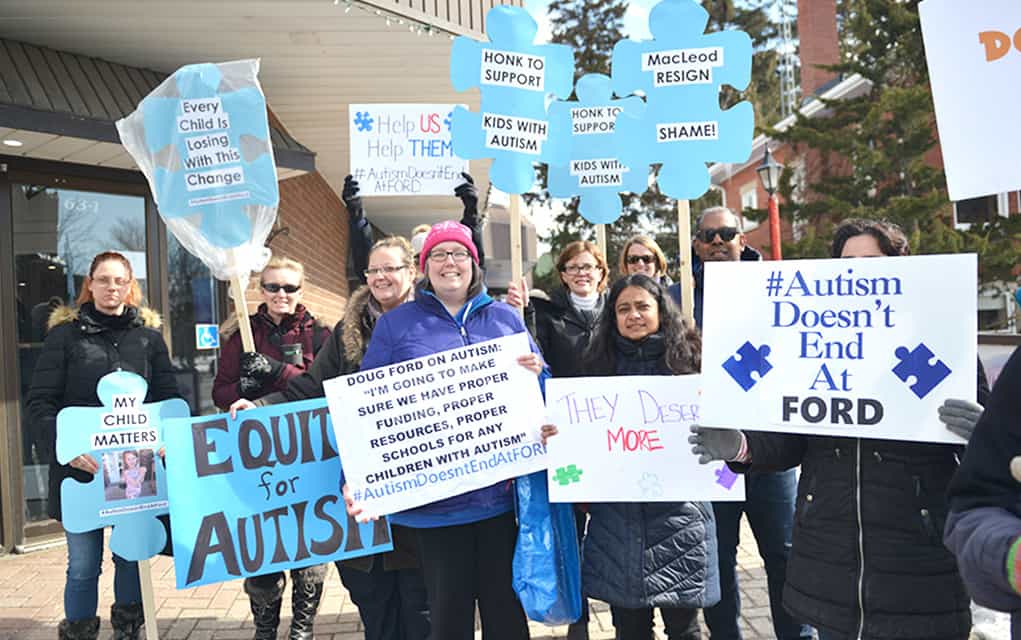The battle against the province’s changes to its autism program got a local front last week as protestors gathered outside Kitchener-Conestoga MPP Mike Harris’ Elmira constituency office.
The action last Friday was part of ongoing efforts to get the government to reverse course on its new funding model to support the families of autistic children.
With proposed changes coming into effect April 1, the government will give funding directly to families instead of regional service providers to clear a waitlist of some 23,000 children in need of therapy across the province. But critics say the move essentially takes money from those currently in therapy to spread it across a wider group, in the end ensuring none of the children gets adequate care.
The new funding model also comes with time limits and is tied to household income.
Terry Lynn Stewart is a local stay-at-home mom who attended the protest.
“My husband makes more than $55,000, my daughter is a nonverbal autistic child,” said Stewart. “She just started to improve – she just started talking, like repeating words, at home. I’ve been notified that in June 2019, she is done. Because our income is higher than that, she’s finished now. She will no longer get any support.”
Sa’id Alam, another parent at the protest whose son has autism, echoed this sentiment.
“He was just starting to improve,” said Alam. “He was getting 20 hours of therapy a week, and now we’re probably going to get just one hour a week.”
One protestor, Tina Mach, said that these therapy programs are crucial to her child’s wellbeing.
“The amount of money that they will give us … I probably would just quit my job and become my son’s therapist,” said Mach. “They learn how to dress themselves, toilet themselves, they learn life skills. Without it, what can they be? They’re going to end up in group homes and our tax money will have to pay for that in the long run. They just think short-term; they don’t think about our future, or our society’s future.”
Under the new plan, families with children under age six are eligible for $20,000 a year, up to a lifetime maximum of $140,000. Children older than six can access $5,000 a year, with the lifetime maximum at $55,000. However, only families earning less than $55,000 can qualify for the full funding amount – a clawback formula would reportedly see funding reduced to zero for families earning $250,000.
Intensive therapy for autism can reach up to $80,000 a year, with critics arguing that it is a “one-size-fits-all” approach to a developmental disorder with a wide range of mild, moderate and severe symptoms. This has sparked a multitude of protests across the province, with another in the region taking place on February 15 outside of PC MPP for Kitchener South-Hespeler Amy Fee’s office.
Catherine Fife, NDP MPP for Kitchener-Waterloo, was among the attendees at Friday’s protest.
“There are good people in the Ontario autism program, and they’re devastated that the government is basically cutting off support without planning for the future,” said Fife. “These are families that are already in a state of crisis and who face stressors each and every day. They don’t need a government to undermine them and to fight with.”
She also criticized the lack of clarity in the new plan, submitting a list of order paper questions to the Ford government regarding the program. At the rally, Fife circulated a petition calling for the government to go back to the drawing board for changes to the OAP.
“I have to say, Doug Ford doesn’t know who he’s messing with,” said Fife. “These families are fighting for their children’s lives, and they’re not going to stop.”
The news release announcing the rollout boasted “widespread reform of the Ontario Autism Program designed to clear the unfair and punishing waitlist” and that it was “expected to clear 23,000 children off the autism waitlist within the next 18 months.”
Earlier this week, there were allegations of leaked emails showing that Ontario’s Ministry of Children, Community, and Social Services directed autism service providers in the province to stop reaching out to families of children with autism, dating back to late-September 2018, effectively freezing the waitlist.
Minister Lisa MacLeod denied these allegations and has defended the new program against the fierce backlash and repeated calls for her resignation or dismissal from cabinet.
Mike Harris also expressed his support for the revised program in an email to the Observer:
“Through the government’s recent changes to the OAP, families will receive Childhood Budgets so they can purchase the eligible support they value most, from providers of their choice, on a fee-for-service basis. Families will be able to do this each year without interruption until their child turns 18.
“This reform will help clear the current 23,000 children off of the waitlist within the next 18 months and allow more children to access autism supports earlier. It will also speed up the diagnostic process so that families can make informed decisions quickly.
“Our office will continue to meet autism families. I want to listen to every parent, and every family member who wants to share their stories and their requests.”









